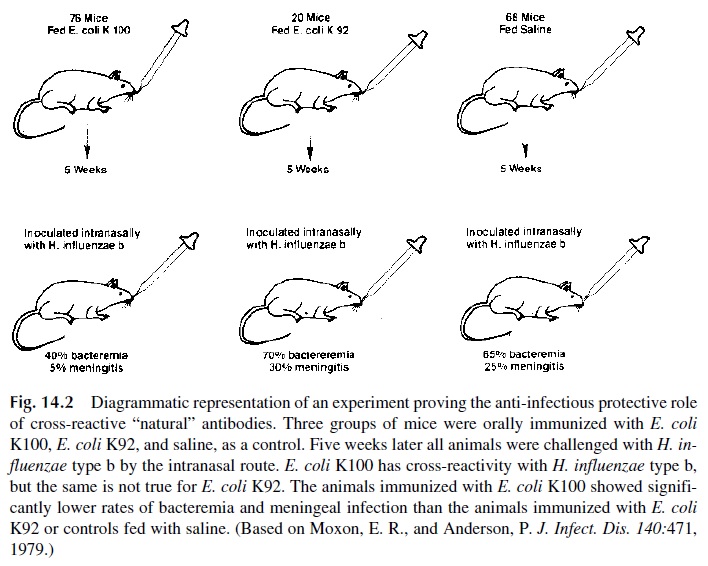Chapter: Medical Immunology: Infections and Immunity
Natural Antibodies
NATURAL ANTIBODIES
Preexisting antibodies may play a very important anti-infectious protecting role. Natural antibodies may arise as a consequence of cross-reactions, as exemplified in the classical studies concerning the isoagglutinins of the ABO blood group system. Circulating ABO isoagglutinins exist in individuals of blood groups O, A, or B and agglutinate erythrocytes carrying alloantigens of the ABO system different from those of the individual himself.
The origin of natural antibodies in most cases appears to be unsuspected cross-reac-tions. Experimentally, this seems to be the explanation for the production of agglutinins recognizing the human AB alloantigens by chickens. Interestingly, the isoagglutinins are produced only by chicks fed conventional diets; chicks fed sterile diets don’t develop them. Furthermore, anti-A and anti-B agglutinins develop as soon as chicks fed sterile diets after birth are placed on conventional diets later in life. These observations pointed to some di-etary component as a source of immunization. It was eventually demonstrated that the cell-wall polysaccharides of several strains of Enterobacteriaceae and the AB oligosaccharides of human erythrocytes are structurally similar. Thus, cross-reactive antibodies to Enter-obacteriaceae are responsible for the “spontaneous” development of antibodies to human red cell antigens in chickens.
Newborn babies of blood groups A, B, or O do not have either anti-A or anti-B isoag-glutinins in their cord blood, but develop them during the first months of life, as they are exposed to common bacteria with polysaccharide capsules. However, newborns are toler-ant to their own blood group substance, so they will make antibodies only against the blood group substance that they do not express. Blood group AB individuals never produce AB isoagglutinins.
Other mechanisms, such as the mitogenic effects of T-independent antigens and the nonspecific activation of B cells by lymphokines released by antigen-stimulated T lym-phocytes, could explain the rise of “nonspecific” immunoglobulins that is observed in the early stages of the humoral response to many different antigens. It is only a matter of ran-dom probability that some of those “nonspecific” immunoglobulins may play the role of “natural antibodies” relative to an unrelated antigen.
Irrespectively of their origin, “natural” antibodies may play an important protective role, as shown by the experiments summarized in Fig. 14.2. Antibodies elicited to E. coli K100 cross-react with the polyribophosphate of Haemophilus influenzae and can protect experimental animals against infection with the latter organism. It is logical to assume that such cross-immunizations may be rather common and play an important protective role against a variety of infectious agents.

Related Topics